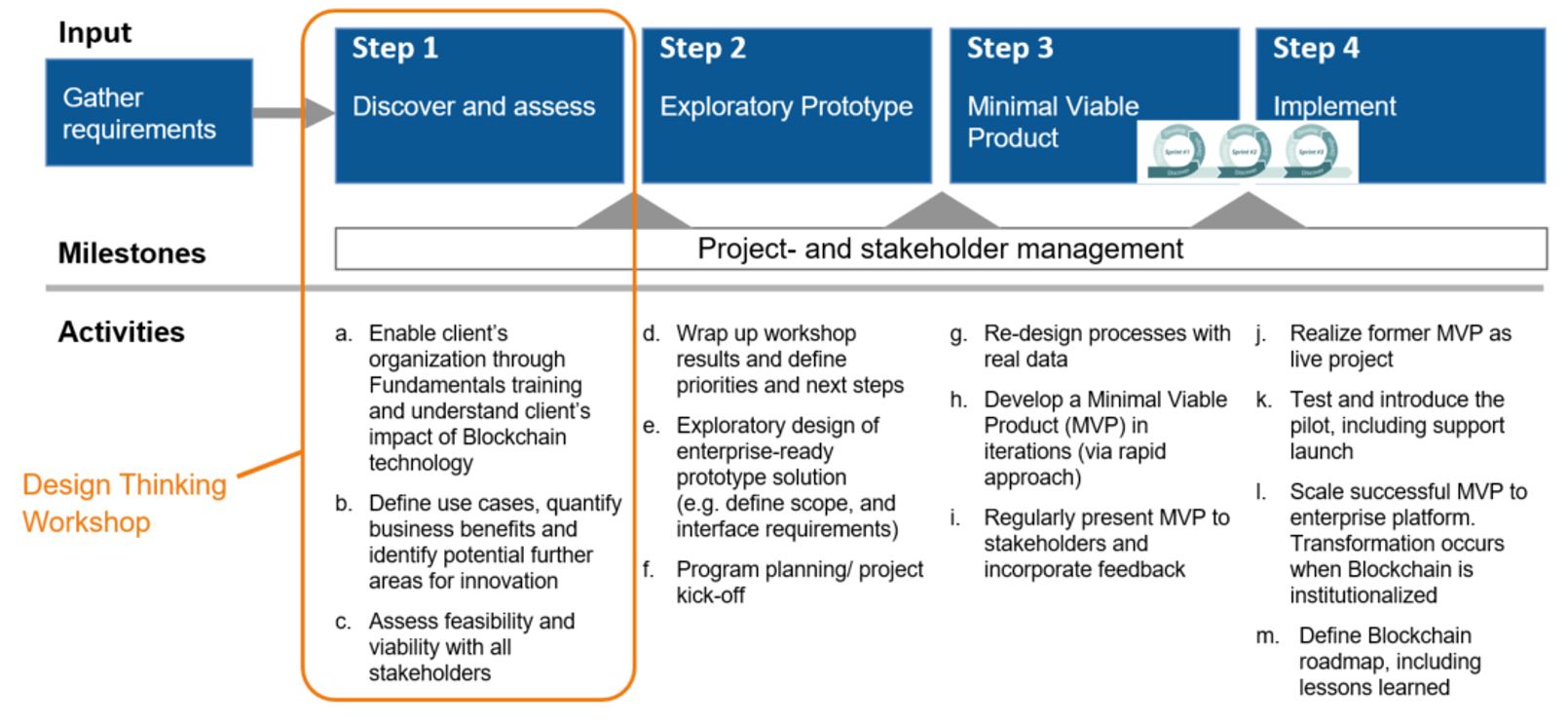Blockchain Technology and Distributed Ledger Technology
Blockchain is an unchangeable database or a constantly growing data set, a so-called chain of (data) blocks. Each block is linked and secured using cryptography with each block containing the hash (input) of the previous block. A blockchain acts as a decentralized database managed by computers belonging to a peer-to-peer (P2P) network. Each of the computers in the distributed network keeps a copy of the ledger to avoid a single source of errors. All copies are simultaneously updated and validated. This makes blockchain technology more trustworthy. In the past, Blockchain was often associated with digital currencies. Today, blockchain applications are being explored in many industries as a secure and cost-effective way to create and manage a distributed database and manage records for all types of digital transactions.
Blockchain Services
Integrate suppliers, customers, and other stakeholders efficiently and transparently into your business processes. Blockchain enables you to exchange information between several parties in a tamper-proof and automated way. This opens new possibilities to optimize business processes and to open new business areas.
As with any new technology, the possible applications are diverse, and the added value is not always clear. It is important to identify the right use case and implement it with the right technology. Only with a clear application strategy can the full potential of blockchain-based solutions be used.
Trust as a Digital Competitive Advantage
Trust is a fundamental value in every business relationship. Therefore, a lot of effort is put into verifying information since data can be wrong or manipulated. Distributed ledger technologies create exactly this trust in a distributed eco-system through peer-to-peer transactions between all participating parties without relying on third-party verification. At the same time, data integrity is guaranteed by the confirmation of all participating parties. The advantage is obvious: With the transformation of existing business processes, a higher degree of automation is achieved through so-called "Smart Contracts". Distributed ledger technologies thus form a core technology in every industry 4.0 transformation.
The possible applications of the technology are manifold and extend across all industries. In recent years, various industry use cases have been developed and tested. In addition to the disruptive potential, however, it was primarily the iterative optimization of existing business processes that marked the promising use of blockchain applications in industry. Whether innovation or disruption - we support your company in selecting and implementing the appropriate use case.
At least since the hype about Bitcoin and other crypto currencies in 2017, many companies have started to work with the technology behind it and have started to look for meaningful applications for blockchain technologies. The focus here is always on peer-to-peer transactions of digital assets via a distributed database with multiple participants. If these requirements are met, blockchain enables new and unique possibilities: Data can be recorded in a way that is tamper-proof and visible to all. In multi-participant business areas, the technology can therefore open new business areas and provide a competitive advantage. Identifying and analyzing the appropriate use case is therefore the priority for successful implementation. Here we rely on our proven AdEx Design Thinking approach for blockchain services.
Once the use case has been defined, the selection of the appropriate technology begins. Depending on the case, the use of a public blockchain or private blockchain is recommended.
We support you in selecting the right technology as a neutral consulting firm with our broad partner network of leading technology providers and start-ups worldwide. In an iterative implementation approach, the solution is piloted and tested as a proof-of-concept before integration into existing business processes and systems and scaling of the use case is started.
Pharmaceutical companies must consider regulatory requirements in the onboarding of suppliers and evaluate them accurately. The process is labor-intensive and repetitive from a supplier perspective. We have put our long-standing customer in contact with one of our partner companies. Here, a block chain-based solution was developed, with which pharmaceutical companies and suppliers can share their certificates, such as supplier audits and self-disclosures. The solution is integrated into existing TPRM processes and systems and enables end-to-end data exchange in real-time between all participants. This enables paperless, secure, and automated supplier onboarding. Additionally, all participants can manage and update their certificates themselves. The effort for supplier onboarding could be reduced from 30 days to 3 days.

- Where and when does the use of blockchain technology make sense for your company?
- Design Thinking Ideation Workshops in Use Case Analysis and Elaboration
- Evaluation of the IT landscape and target architecture
- Integration of the blockchain solution into existing business processes and systems
- Provider-independent consulting in the selection of the right technology for your use case
- Technical know-how paired with a business perspective and an understanding of the overall architecture (solution must be able to scale and fit into existing system landscape).
- We build the bridge between IT and business and can present and communicate the topic at C-level
- Methodological competence as hidden champion for program and project management skills





